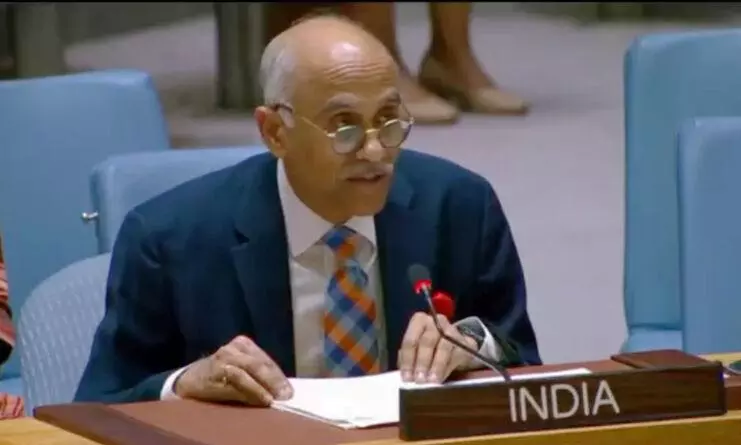
India’s permanent representative to the UN Parvathaneni Harish speaks at the UN Security Council Open Debate on ‘Women, Peace and Security’ in New York on Tuesday (Oct 7). Photo: PTI
India at UNSC accuses Pak of ‘genocidal mass rape’ in 1971, bombing its own people
India’s permanent representative to the UN Harish said the world sees through Pak’s propaganda, and that India’s record on the ‘women, peace and security’ agenda is unblemished and unscathed

In a strong retort against Pakistan in the UN Security Council, India on Monday (October 6) said its neighbour is a country that “bombs its own people” and conducts “systematic genocide”.
‘Operation Searchlight’
During his remarks to the UNSC open debate on “Women, Peace and Security”, India’s Permanent Representative to the UN Ambassador Parvathaneni Harish said Pakistan conducted Operation Searchlight in 1971 and sanctioned a systematic campaign of genocidal mass rape of 400,000 women citizens by its own army in what was then East Pakistan.
On March 25, 1971, the Pakistani army had launched a brutal crackdown against Bengalis, involving widespread civilian killings throughout East Pakistan code-named “Operation Searchlight”.
The operation was overseen by General Tikka Khan, Pakistan’s notorious military commander who got the nickname the “Butcher of Bengal”.
These atrocities happened during the 1971 Liberation War which eventually led to the formation of Bangladesh.
“Every year, we are unfortunately fated to listen to the delusional tirade of Pakistan against my country, especially on Jammu and Kashmir, the Indian territory they covet,” the Indian envoy said.
“A country that bombs its own people, conducts systematic genocide, can only attempt to distract the world with misdirection and hyperbole,” Harish said.
The world sees through Pakistan’s propaganda, he added.
The “bombs its own people” remark was in reference to the Pakistani air force killing more than 30 people, including children, in an air strike in the Khyber Pakhtunkhwa province last month.
Also Read: India slams Pakistan at UN, says it's steeped in 'fanaticism, terrorism'
India’s strong response in UN
Harish told the council meeting chaired by Russia that India’s record on the "women, peace and security" agenda is unblemished and unscathed.
India’s strong response in the council came after Pakistan, in its statement, raised the issue of Jammu and Kashmir.
“To exclude Kashmiri women from the Women, Peace and Security agenda erases its legitimacy and undermines its universality,” the Pakistani delegate Saima Saleem said in her statement.
Also Read: India slams Pakistan at UNSC for sponsoring terrorist attacks
‘India’s pioneering recognition of women’
Harish, in his remarks, also said that India remains unwavering in its commitment to the “Women, Peace and Security” agenda and stands ready to share its expertise with partners, particularly those in the Global South, fostering collective solutions to shared challenges.
He highlighted India’s consistent contribution to UN peacekeeping as an expression of its commitment to global peace.
“What distinguishes India's peacekeeping legacy is not merely the scale of our contribution, but our pioneering recognition of women as indispensable agents of peace,” he said.
As early as the 1960s, India deployed women medical officers to the Congo, marking one of the earliest instances of women serving in UN peacekeeping operations, the ambassador said.
Also Read: Operation Sindoor aligns with UNSC call against terrorism, says India
This was not merely a symbolic gesture but a practical acknowledgement that women's perspectives, skills, and presence are essential to effective peacekeeping, he said.
In February 2025, India hosted the International Conference on Women Peacekeepers from the Global South, bringing together women peacekeepers from 35 nations.
The two-day gathering examined the evolving challenges facing women in peacekeeping operations — from addressing sexual exploitation and abuse to leveraging technology for enhanced effectiveness.
The conference was not merely a forum for discussion but a platform for developing actionable strategies to increase women's participation and their impact in future peace missions, he said.
(With agency inputs)

